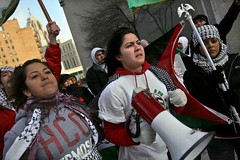
Detroit demonstration in support of the Palestinian people under siege in Gaza. The event was held in downtown Detroit on January 8, 2009.
Originally uploaded by Pan-African News Wire File Photos
PARIS (AFP) - - Women rallied worldwide Sunday to demand equal rights and protest against domestic violence and growing poverty in the global economic crisis as they marked International Women's Day.
Thousands gathered in public squares from Bangalore to Kinshasa to the capitals of Europe, drawing attention to discrimination and fears facing women in their respective countries.
For Europeans, deteriorating financial security in the face of recession has made life more precarious for women workers. "Masculine globalisation equals female poverty" read a banner at a march in Madrid, while in Warsaw calls for equality were linked to paychecks: "Equal rights, equal pay."
"When, in times of crisis, jobs become scarce, women are often the ones who are the first to go," said Hlega Schwitzer, a leader of Germany's powerful IG Metall union.
"Women must not be the losers in the crisis," she told a gathering in Emden, northwest Germany, as she noted that women still earn on average 23 percent less than men.
US President Barack Obama said women are "vital" to solving world challenges and called for "the full and active participation of women around the world."
His former White House rival, Secretary of State Hillary Clinton, celebrated women's untapped potential but lamented that "no nation in the world has yet achieved full equality for women."
The French government sought to raise awareness by releasing a book for 18-year-olds titled "Respect Girls", warning teenagers not to buy into stereotypes in advertising and provide information on sexual harassment and equal opportunities.
"These few pages will help you know your basic rights so that you can translate this into positive and ambitious life choices," Valerie Letard, state secretary for women's issues, at a meeting with about 100 young women in Paris.
The Vatican took a different spin on Women's Day, proclaiming what has liberated Western women the most is none other than the washing machine.
"The debate is still open. Some say it was the pill, others the liberalisation of abortion, or being able to work outside the home. Others go even further: the washing machine," the official Vatican newspaper said.
For women mainly outside the West, however, their very existence is in peril from violence and cultural attitudes that endanger their lives.
Indian activists in Bangalore, in India's south, met in parks and open areas to protest a spate of violent attacks on women by religious extremists in the name of "moral policing."
In Africa, women called attention to the plight of their sex in war zones. Some 10,000 women marched in the streets of Kinshasa to protest massive and savage violence against women and children using them as a weapon of war.
"The desires of Congolese women are clear: stop rape, stop HIV/AIDS, and stop other human rights violations against women and children," said Marie-Ange Lukiana Mufwankolo, family minister in the Democratic Republic of Congo.
Darfur rebel leader Abdel Wahid Mohammed Nur called for support for women and girls in the strife-torn region who are "victims of Islamic fundamentalism and ethnic cleansing."
"I call upon all women in the world to celebrate Women's Day by helping Darfur people and Darfur women and girls," Nur told AFP in Paris, where he has been living in exile for a year and a half.
In Iraq, despite post-war reconstruction, many women -- especially widows -- are too poor to provide for their families, according to a report by aid agency Oxfam, published to mark International Women's Day.
"I was convinced that I could improve conditions for women, but I ran into a wall," said Nawal al-Samarrai, Iraq's former minister for women's rights who resigned in despair over lack of support last month.
Another female politician who has risen to the top in a male-dominated society, Shukria Barakzai, an Afghan member of parliament, also lamented her gender's plight.
She is campaigning against forced and child marriages -- practices still common in Afghanistan -- after her husband took a second spouse.
"It is very painful for me that my husband has another wife. I myself am a victim of male violence against women in this country. My husband married his second wife without even telling me," she said.
Muslim women around the world are facing a "growing crisis" as Islamic governments fail to honour commitments to end inequality and violence against them, an independent UN expert warned.
Yakin Erturk, the United Nations' rapporteur on violence against women, told a weekend conference in Malaysia that women must demand their governments carry out pledges to grant them equal rights and ensure their safety.
UN Secretary General Ban Ki-moon said this week one woman in five around the globe has been a victim of rape or attempted rape, and that in some countries one woman in three has been beaten or subjected to some kind of violent act.
No comments:
Post a Comment